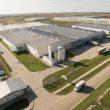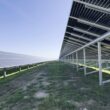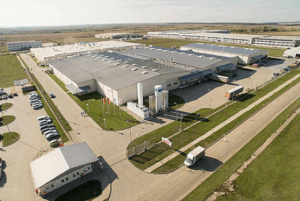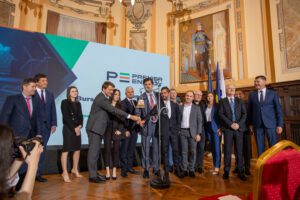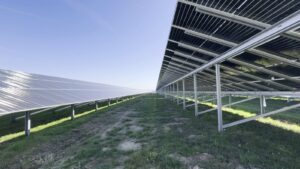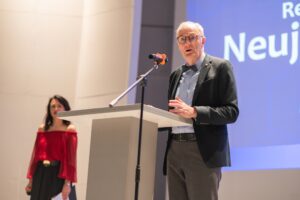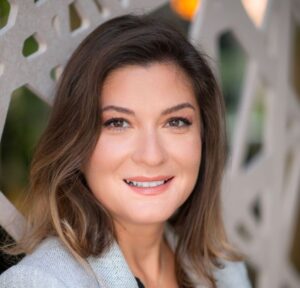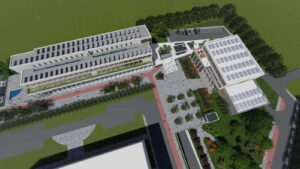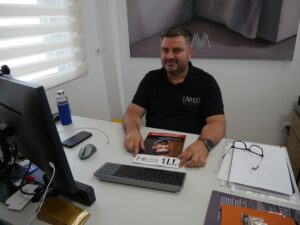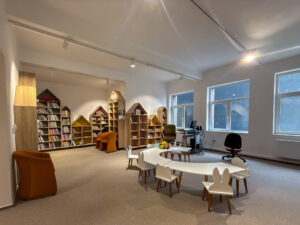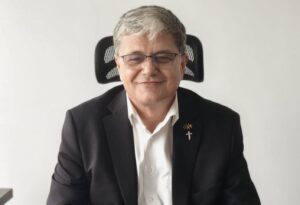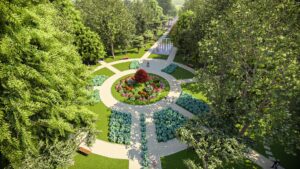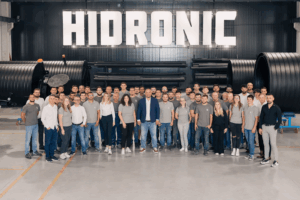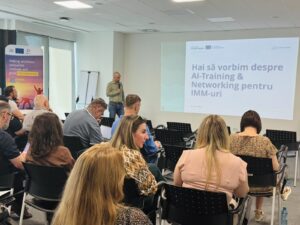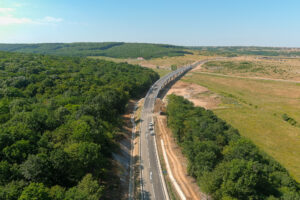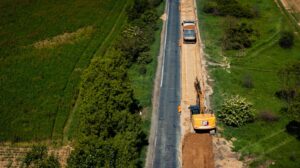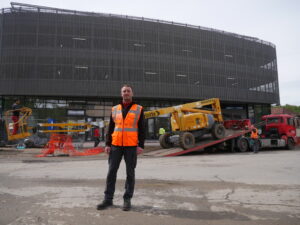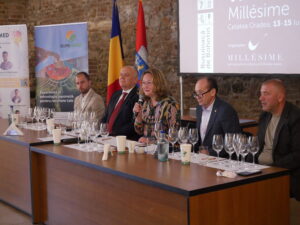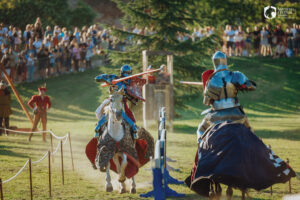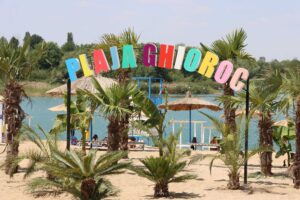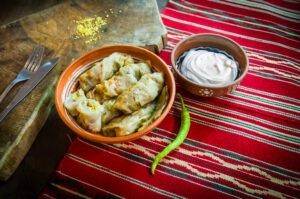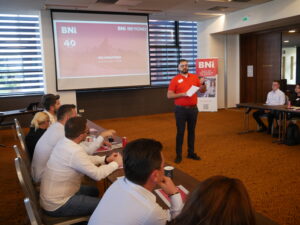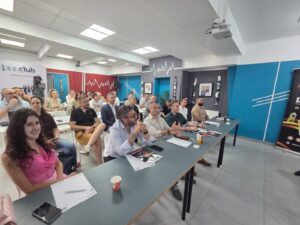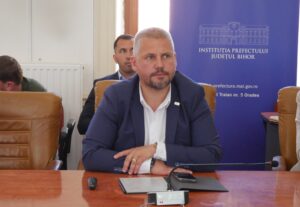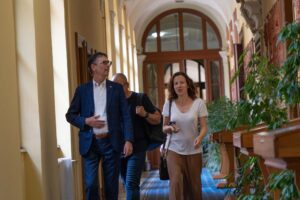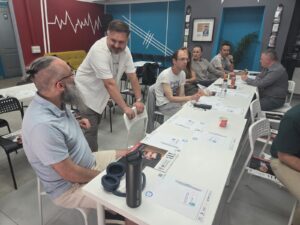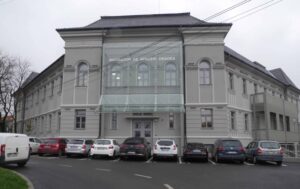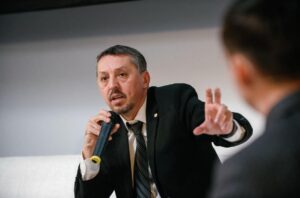Four friends crossed a country on foot, from the Tihuța Pass to the heart of Szeklerland. They prospected a future road. The question that guides them: what effects could arise from rediscovering the homeland’s intimate fiber, seen from up close, afoot? Each one will find a different answer after 9 days and approximatively 200 kilometers of walking.
Day One
The mists rise and the sun comes out a bit. With our backpacks on, we exist through the campus gate, we turn right, and, like pilgrims, we slowly set out, at a temperate step, on the path guarded by fir trees. We set out to a place with a beautiful name: Străjii (Sentinel) Valley. There, somebody is already working on a peerless tripe soup, which the four of us know too well. And, just like that, the morning’s timid dream receives a vectoral, concrete sense: with sour cream and hot peppers, the way the traveler likes it.
The first 10 kilometers are for adjustment, followed by wandering on the edge of some Mureșenii Bârgăului apiaries. We nibble cherries on the go. Both sweet and sour. Next, we have a relatively tough climb toward Brazii Buni (Good Fir Trees), while we mark the places that matter in the GPS.
The sight at the watershed, in a place named Poarta Bistriței, opens towards five townships on the Bârgău Valley: Mureșeni, Tureac, Tiha, Prund and Bistrița Bârgăului.
On the way to Uncle Vasile’s chalet, who picked us up on the way, we come across three trout farms – closed but promising. The king of trout farmers is no other than Uncle Vasile, who, in the old days, in the 90s, broke the shore with sales amounting to half a ton around New Year’s Eve. Then the competition wolfed him down and he quit.
His coolest story is with a bear who, in 1974, was sweet enough to swoop down one of his calves. Out of spite, Uncle Vasile, then young and brave, charged at the bear. He put his axe down and hit him in the head with a rock.
A mistake. This thing cost him a month in hospital and an eye, because “the bear was badly innervated”.
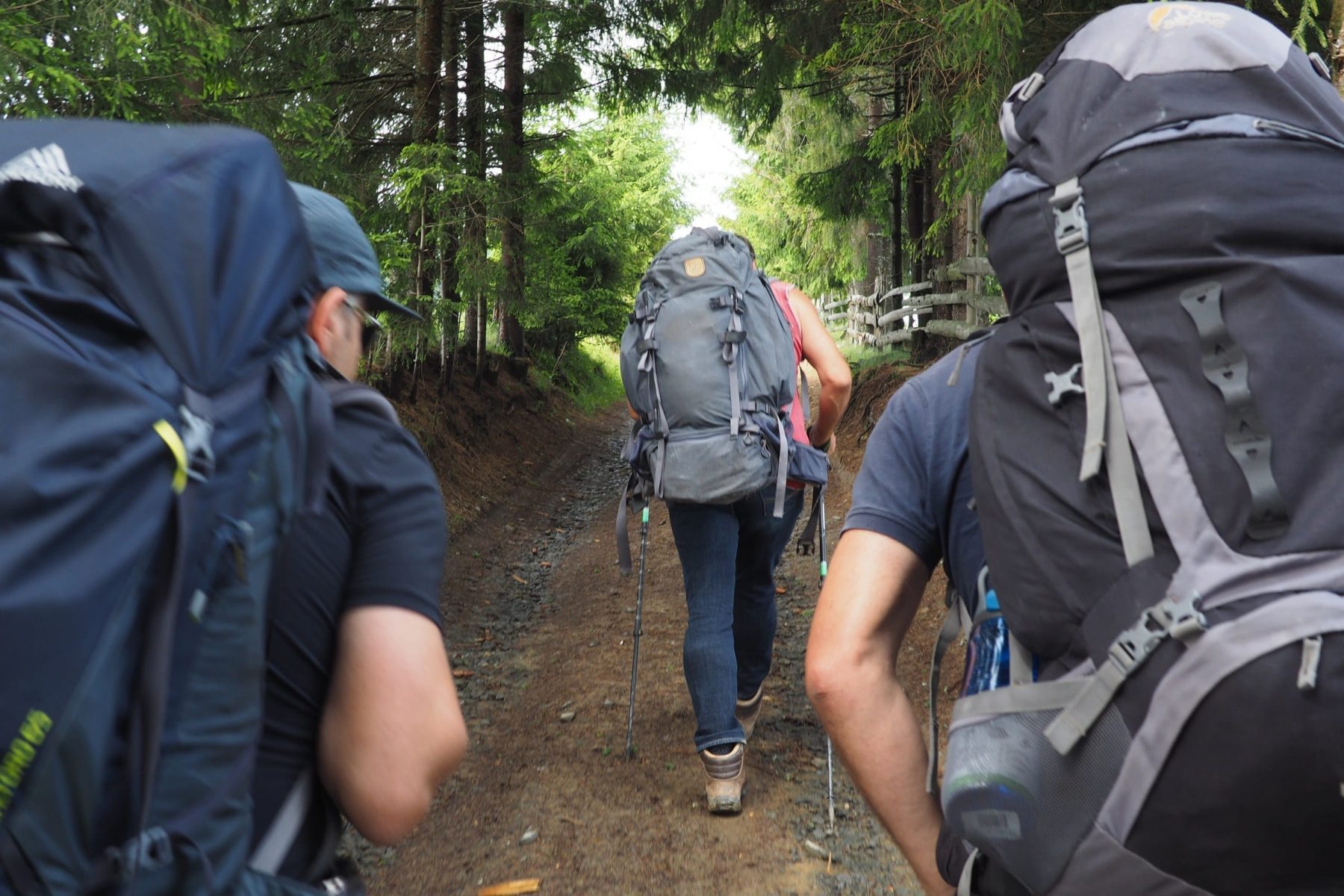
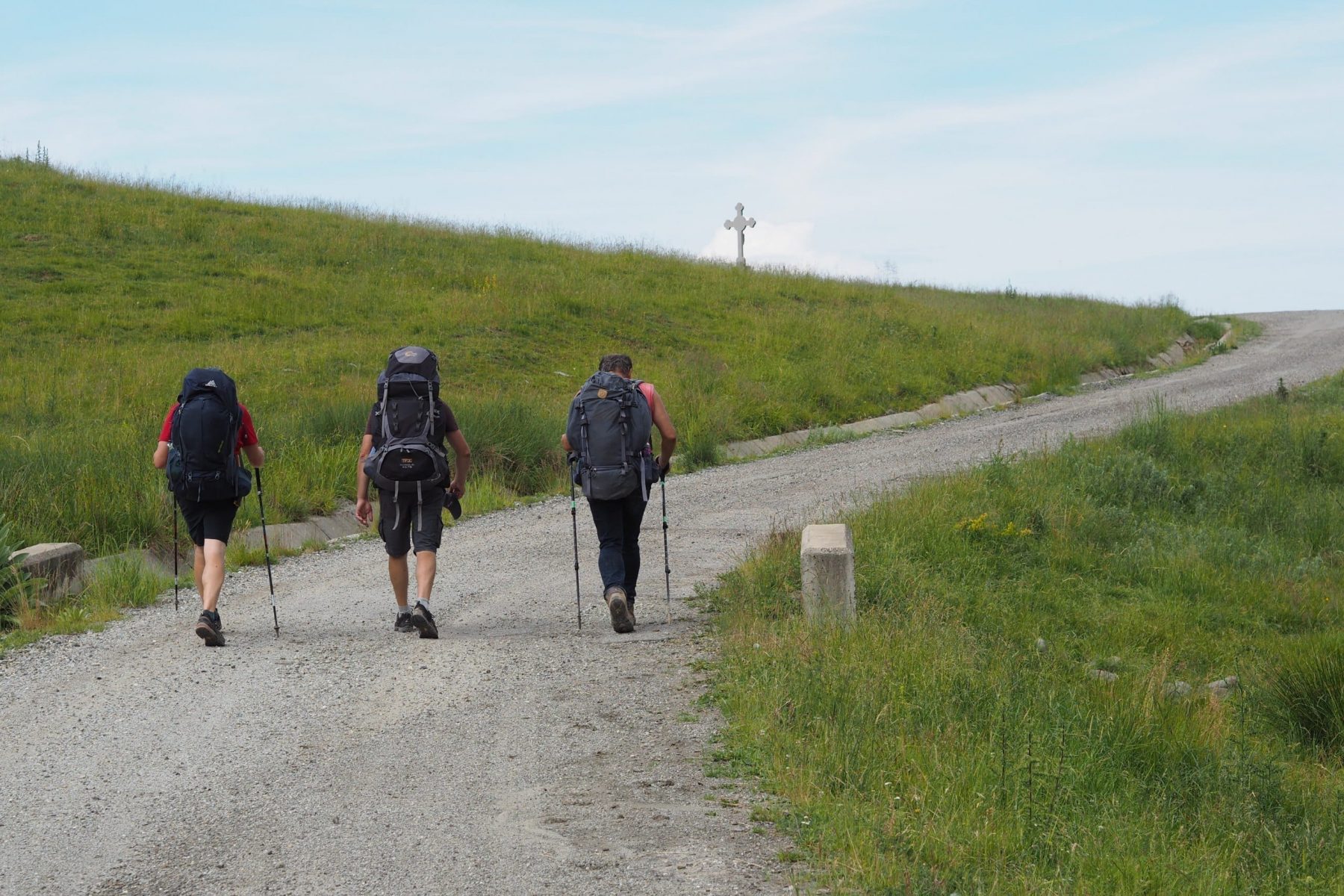
Day Two
Generally, the image of travelers who seem to wander aimlessly begets outright astonishments, but not many have the courage to ask us who we are, where we come from and where we are heading. This was kind of, I think, the medieval pilgrim’s condition: you treated him nicely as you would with a usual suspect, because you didn’t know what he carried in his bundle. You didn’t know if he was some thief, a fugitive or a king in disguise, purposefully mixing with the parishioners, to learn what their thoughts are.
We climb the Dealul Negru (Black Hill), Ceaușescu’s famous hunting ground. The billboards with “Shelter the fowls” are the irony of ironies. On the right, the Cușma village lies exactly like in the cup of a palm, as, for that matter, all the villages one can see in the distance. The landscape is vast, soft and embroidered with bluish mountains, right in the background.
Not far away, a man is talking with his horses. We carry on a conversation. We find out that all the community’s horses are let loose there, to graze. The image reminds me of Kyrgyzstan, a world of free horses and mad riders.
On the top of the hill, the entire panorama opens. As the poet Ioan Alexandru wrote: “Transylvania is a hymn”. Next to the road, two perfectly round pies of asphalt: the heliport where Ceaușescu would land when he came to “gun down bears”. They say Khrushchev also passed by here in the days of Dej and fell in love with the Lechința wine.
The area’s maximum interest point is Ceaușescu’s chalet, now restored, which can be rented for various events, but with early enough booking. It maintains a few original elements: the cast iron lanterns on the alleys, stag antler candelabra, bear trophies stacked on the wall and two enormous terracotta stoves, which had special loading champers, from the back.
They are, it seems, the masterpieces of a French artisan. I try to imagine how many blow-outs, forbidden stories and scenes, if they could talk, the terracotta stoves.
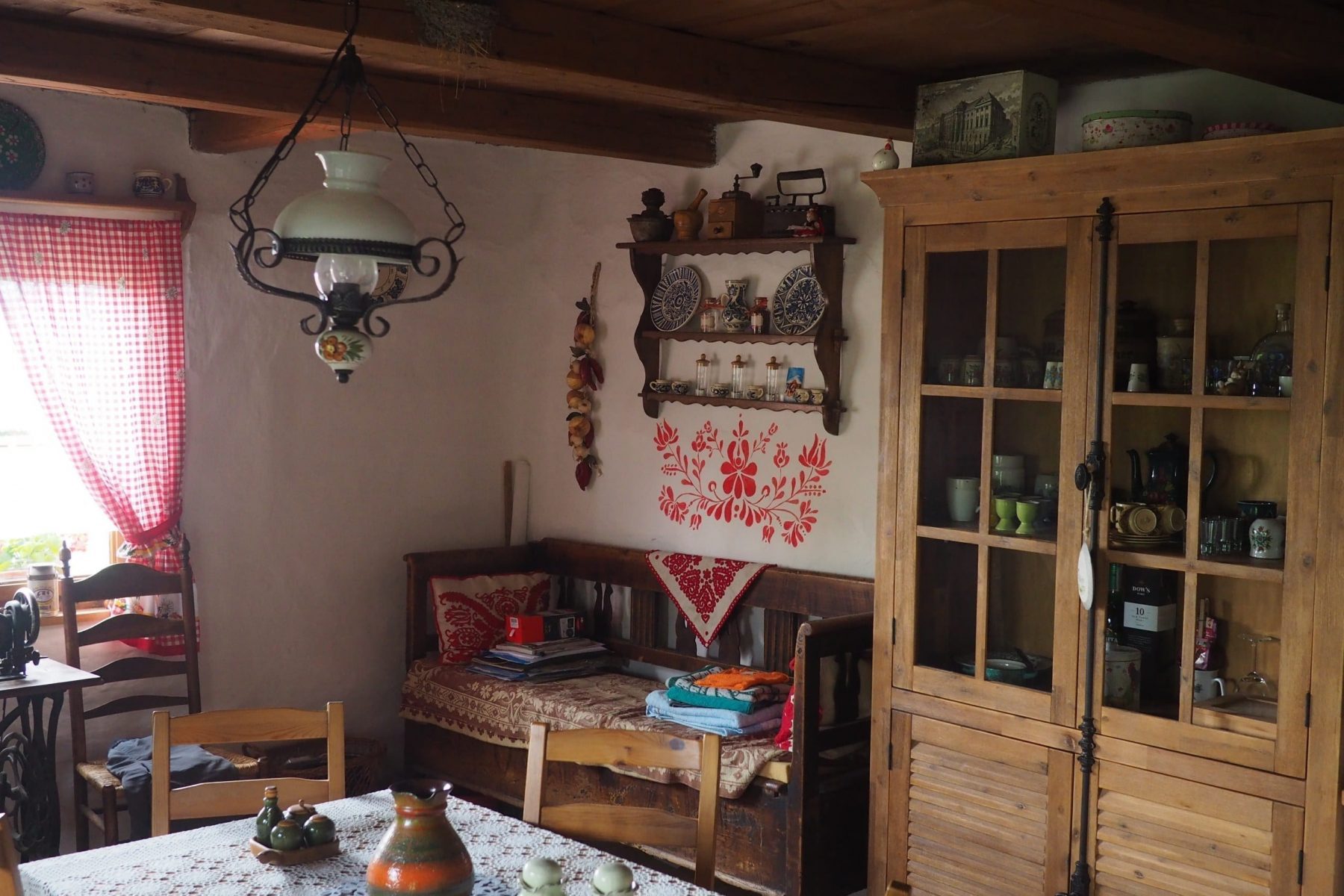
Day Three
We go forward silently and crooked by our wet tents and rucksacks, dreaming about better times. On the old CAP (Agricultural Production Cooperative) there is a burnt doll, with a wire hanging from its neck, like a noose. The last thing we needed was some morning Transylvanian voodoo.
The Măgura hill seems to be close, but the way there doesn’t seem to end. A little puffing tractor, like a toy, catches up with us and the man stops just like this, to look at us. I think we look like retreating soldiers, coming from some lost battle, in an absurd war, like all the world’s wars.
On Măgura we come across a monument, next to a cross with World War I hero names inscribed on it. From there a 360-degree perspective opens around us – Spatiul Mioritic (the Mioritic Space), in all its splendor. A timid sun begins to dry our clothes hanging from the rucksacks and the bearer pants as we walk.
A new portion of asphalt follows, until we come across the apple orchard above the former hunting mansion, long abandoned, belonging to Count Teleki. The mansion was built in the Baroque style in the village colonized by the Germans a long time ago, sometime in the mid-18th century. The entrance bastion had a chapel and it also served as a guest house.
As you enter the beautiful yard, with a garden and benches in the middle, you can imagine the carriages coming and pulling in front of the rectangular-shaped castle, surrounded by stables, sheds, plus a small prison.
The Communists nationalized it in ’45 and changed it into an IAS (State Agricultural Enterprise). They cut the forest around it and made space for boozes next to the lake and, to wash away some of their sins, they planted an apple orchard nearby.
Now everything is looted, broken, ravaged. The metal heraldry was torn out and carried by tractor sometime ago, maybe taken to be scraped or used to cover some hole in a stable somewhere.
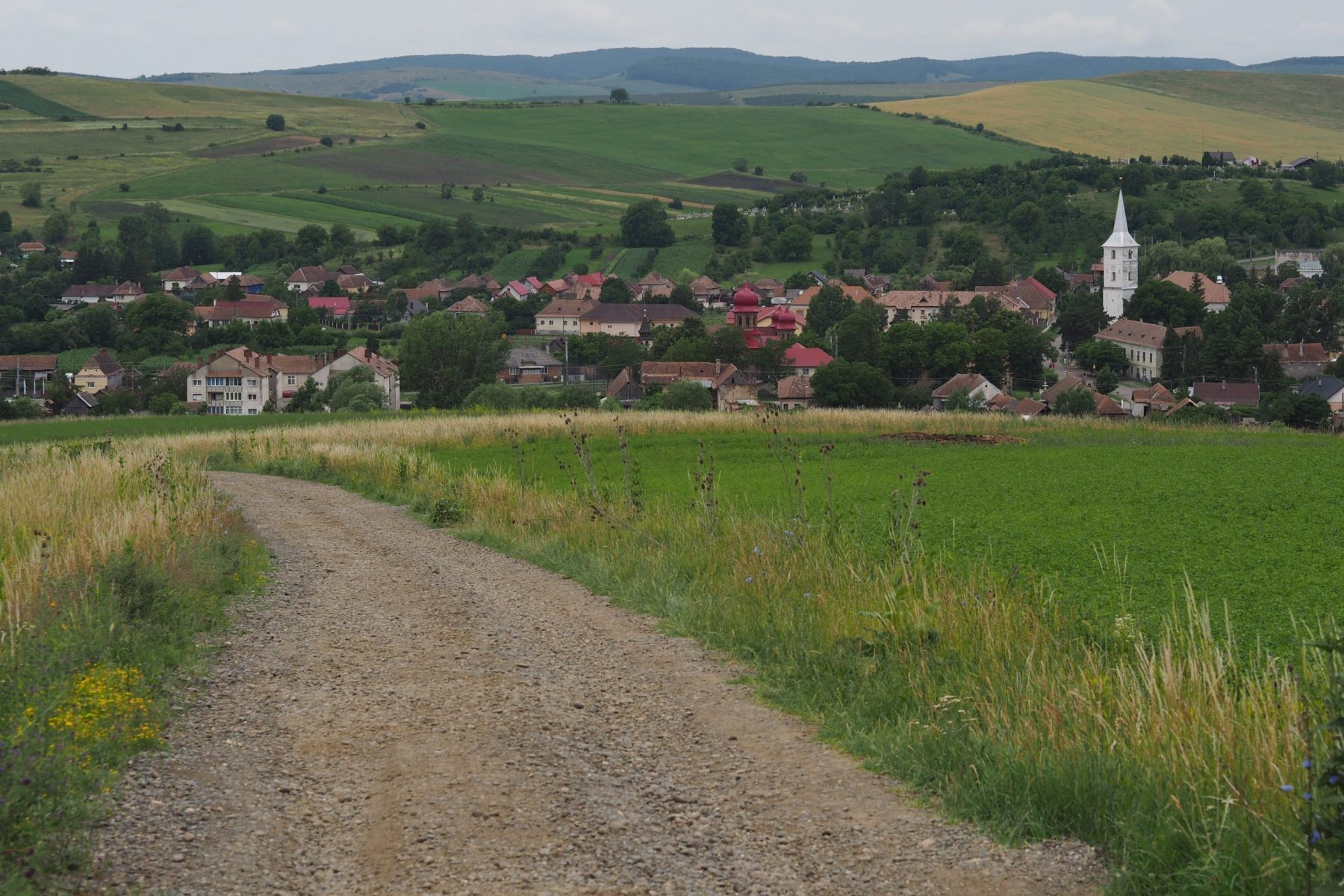
Day Four
For us, the wanderers, a new stage of asphalt follows until Batoș, from where the great wilderness dalliance will begin. It’s just that we don’t know this yet. So we charge into the township, otherwise quite garnished. When you go into a totally new place, small details of the first 100 meters help you realize if the mayor is thoughtful of the citizens, or if he or she leaves them to fend for themselves.
For example here, in Batoș, not only you have playgrounds, sidewalks, flower garlands, but also a statue of a giant apple, next to an infinite column, all in front of a church with a very Russian air, like we saw last year throughout Siberia.
We are going there as well, to find out from the people what would the best way for us to follow to Reghin, to avoid the asphalt, as much as possible. There, a photographer’s occupational hazard, I immediately notice that, under a large red umbrella, there are three guys in red t-shirts, plus a plump and jovial old man, Uncle Relu, who periodically tenderly kisses a little bitter beer grenade, only for strong men, which he must have been in the old days.
Bent above the maps, what follows are passionate debates about where we should go, interrupted by “You shut up, Uncle Relu!” any time Uncle Relu, a vigorous tavern pillar, proposed a route reconfiguration. From his stillness, he issued erudite opinions about movement.
“Climb that hill, go on the ridge until you reach an abandoned cottage, from there you can see the Lilac Wine Cellar vineyards, and then descend in the valley to a watering hole and you have to walk a lot toward the right, until you see the corner of an oak forest. ‘No,’ then from there go down to the highway heading to Reghin”.
And the triumphal entrance to the city of Hora musical instruments, with beautiful and straight sidewalks, after more than 25 kilometers of zig-zag walking, is a load of promises with a perfume of civilization and, especially, of cold craft beer, bearing the name of Csíki Sör.
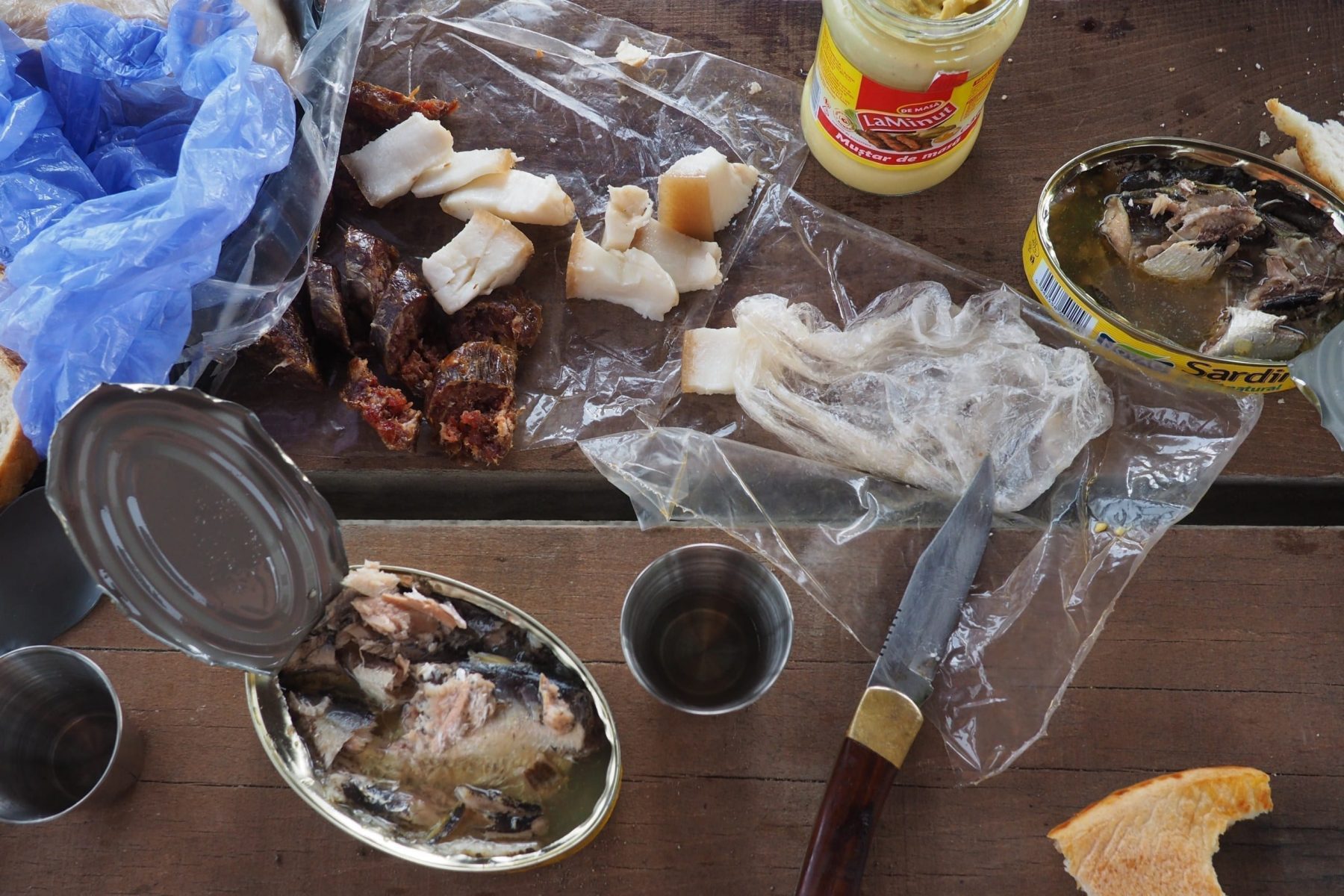
Day Five
The sky is heavy, dark and threatening. We ask the way to Iernuțeni and, out of five people, three decide it would not be good to mingle with strange people. So they remain silent. Our friend Google gets us out of trouble, through a road on whose end there is an elderly people home, next to a railway, beyond which it is backed by a cemetery, at the edge of the forest.
A road cradled with walnut trees takes us through strange villages, like they were forgotten by God and people. Lower and Upper Beica, Căcuciu, Șerbeni and Lower and Upper Chiheru. Seen from afar, they somehow seem beautiful, with white steeples puncturing the sky, but from up close they prove to be deader than the fox found on the path, frozen in a sort of run.
All these villages seem more unmovable and more naïve than the wooden crucifixions in Beica de Sus (Upper Beica). They seem to have lost the match with progress, with the future. They are waiting resignedly either their extinction, or some unexpected rebirth. Time will tell. We meditate on these and on the globalization sitting in the rain and eating mackerel canned in oil produced in Thailand, imported in Dolj and which mysteriously ended up in Căcuciu.
The only village in which life still vibrates somewhat is Beica de Jos (Lower Beica). Otherwise, they’re depopulated and silent just like the football field where the brambles are one meter high. A child on holiday, bored to death, rides his scooter in parallel with us and rapidly summarizes the situation: “My brothers have gone to Germany. One works on spices, the other on salami. I only have three children on the street, but I don’t really get along with them. The village is half-abandoned. I think I will go to Reghin as well, to school. Maybe I’ll become an electrician. Or I go to my brothers. Take care on the Devil’s Bridge, because a friend fell in a ditch there riding his bike, and it was daytime”.
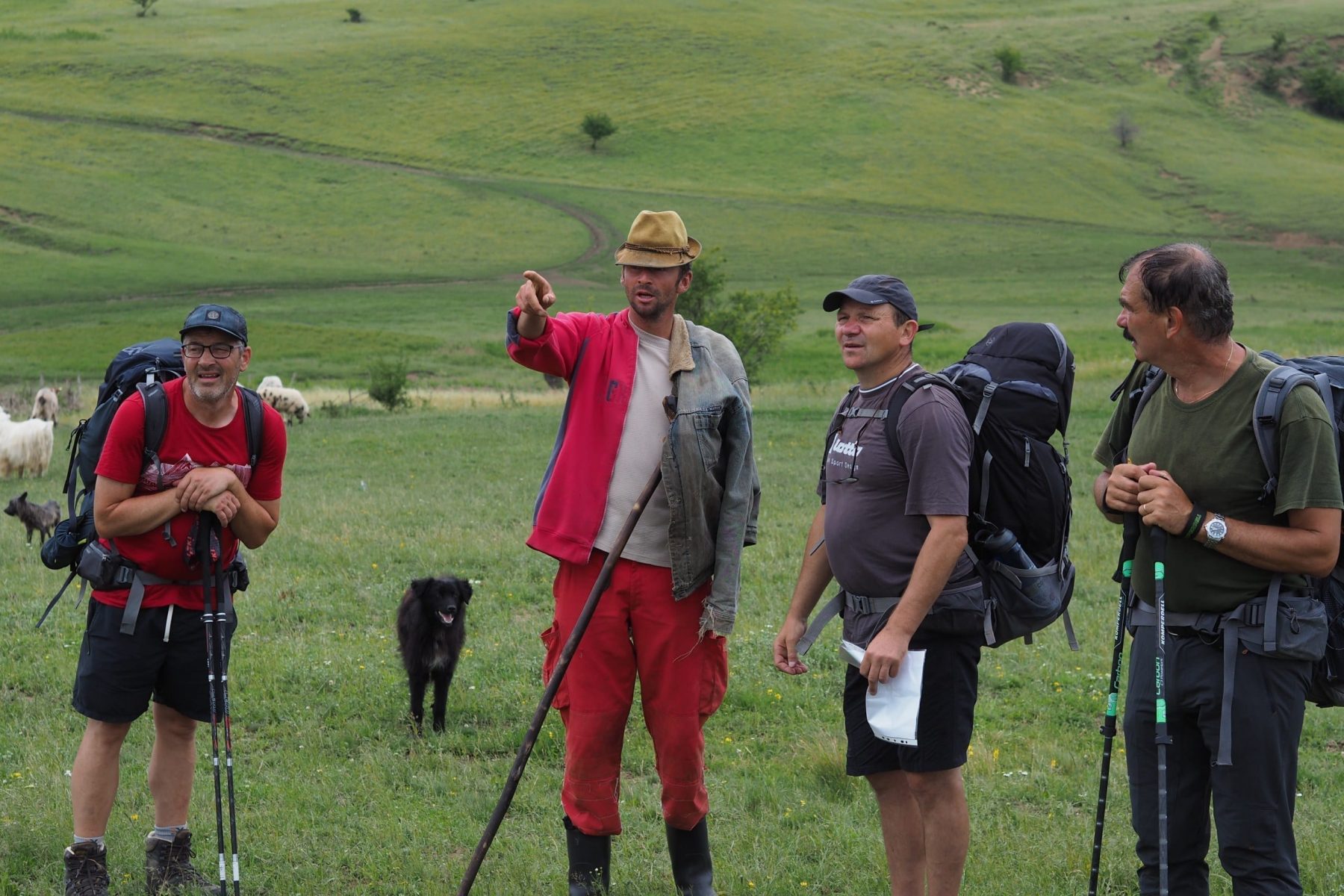
Day Six
On the entrance board for Sovata there is a delicious grammatical disagreement: “Localitate (locality – feminine) supravegheat video (video surveillance – masculine).” A long time ago, Sovata was a sort of legendary location, where one would walk with these words hanging around the neck: “Take me to Sovata, mother/So I can also meet my father”.
Why? Because it was a resort known for its salt waters which cure various gynecological disorders, and it even stimulates fertility. The fact that there were two military units in the vicinity increased the effectiveness of treatment sessions with such a great success rate, that it was said that some women would return from these baths already pregnant.
Today the resort is modern, beautiful, filled with flowers and spas. You can ride the steam train to Câmpul Cetății (Field of the Fortress), you can shoot around at paintball, you can have horse-riding tours, or you can lie on a lounge chair next to a pool.
The guesthouses struggle to have magazine-worthy floral arrangements and rock formations, mandatorily with large lavender bushes. It seems like a landscape design competition.
There is an air of universal peace, as we are going up to the station on none other than the Liniștii (Silence) street. We struggle to find rooms without matrimonial beds. In the resort, everything is renovated, filled with people and restaurants offering menus that suggest that maybe you have ended up, accidentally, in some culinary heaven: tripe stew with onions, grilled mutton, catfish paprika with Szekler noodles, ribs in sweet chili sauce, like we first had in America. And a blend of white Miniș wine, crafted by Balla Geza, for those in the know. In an ice bucket. Two, please. Thank you.
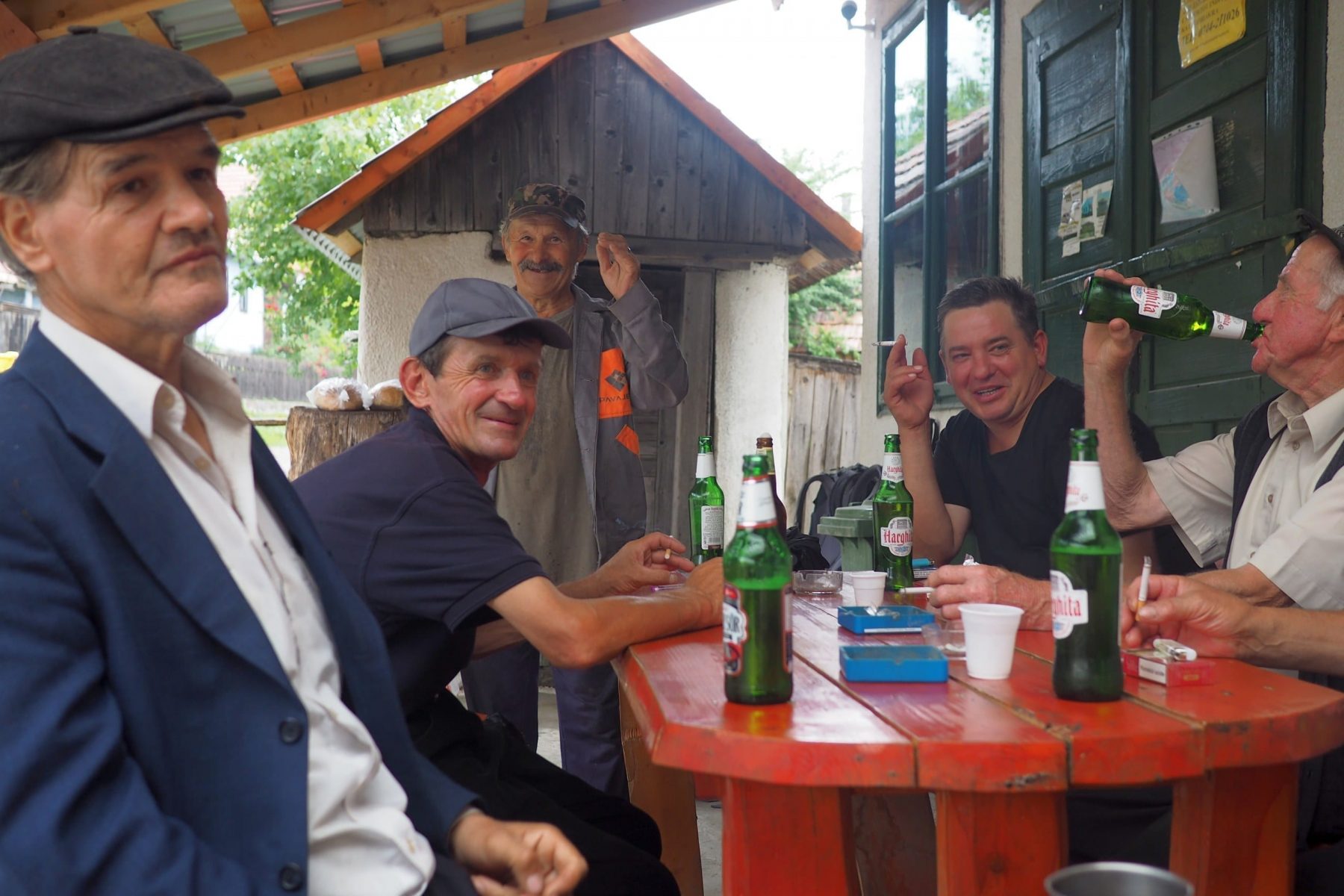
Day Seven
Sovata’s birds either have a broken biological clock, or they’re only thinking about mating. At around 4 they started singing at the top of their lungs, all at the same time. They were backed by two husky roosters, convinced they too were singing birds, not base ingredients in the vermicelli soup known as “leveșă” in Transylvania, served hot on Sundays, with lots of parsley, right after returning from the holy church.
Waking up not because of some defective alarm, but from bird trills whose volume are too loud, this is the perfect training for the Heaven seen as a “place of greenery, from where all sorrow has escaped”.
The morning is joyous and refreshing. Our spirit is so raised by the chirping cacophony, that we drink four coffees on a table’s corner, on the sidewalk, and we almost take off at naughty pace, almost forgetting to pay them.
We pass horses farm bred for equestrian tourism, but also by one for pit bulls, destined, I hope, for protection, and not for the clandestine dog fights. Our senses open in the Ilieși village, where we change our wet t-shirts how the postal horses were once changed.
There is such a humidity in the air which only in Havana, in August, we have served before. A chilly Harghita beer prepares our souls for entering the land belonging to the one called God’s Chainsaw, may he rest in peace, because many hectares of forest have been obliterated under his order. The storm clouds gather above the Atia village, hidden under a thick mantle of larch. A lightning bolt makes us mend our pace toward the tavern in the middle of the village. It is the third time this has happened to us. We immediately take refuge and take our shoes of, this having become a standard gesture, as the bubbly summer shower begins. We look at the water, at the streams forming on the road. In one hour both the rain and the wake are over. And everything, but everything, suddenly takes a memorable turn.
A thin, athletic gray-haired guy with a timid smile shows up out of nowhere. One of the patrons must have called him. His name is Árpi and he invites us to his place. His sister, Ildi, welcomes us to the outside table, also smiling.
His yard is vast, and the house – wonderful, decorated with a genuine passion for traditional design. And his attic is equipped with exactly four beds for guests.
We have that fortune we have been waiting for and have only found with Uncle Vasile, in the first day. To find some local hospitaleros, ready to offer, for a price, their space to travelers. The same way as it is on the Camino. The way it should also be in our country.
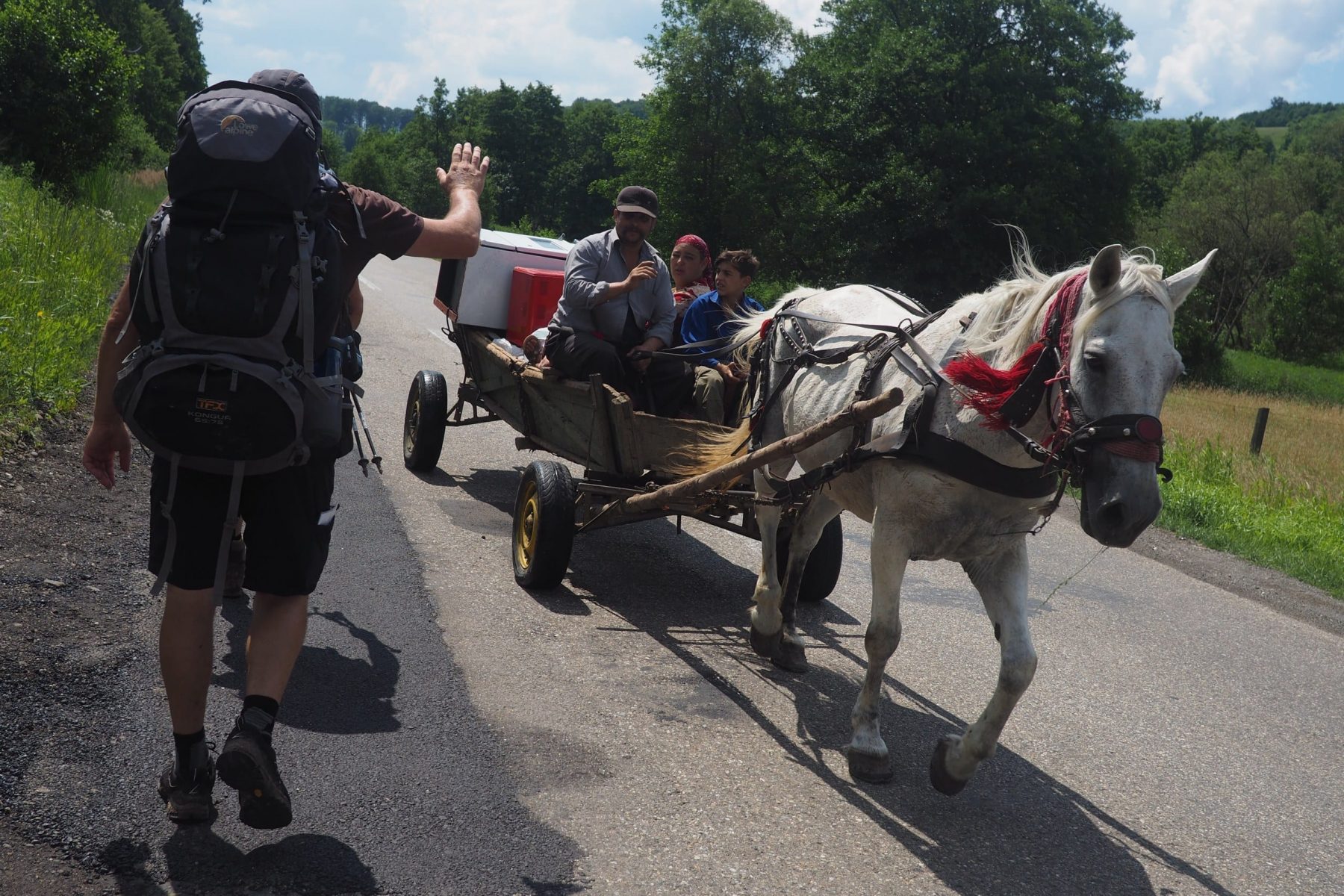
Day Eight
The houses in Firtușu seem like a museum in conservation. Above the gates sculpted with vines small bird houses were built in rectangular shapes, with shingle roofs. The Szeklers are great woodworkers. I kept looking at dozens of little houses, but I saw no bird going in our out. The birds stay where they want to stay, not where the people build houses for them.
Right outside the village there is a jolly shindy. Smiling people ask you, looking you straight into the eyes, essential things: who are you, where you come from and where are you going? It’s incredible how much life it emanates, how much intensity this colorful and energetic vicinity contains, without which Transylvania would have been so much duller.
A few naked children drive a wheel with a stick, like what I saw in India, in Digha. Women in pleated skirts haughtily breastfeed, at the house threshold, men perched on the roof mend it with tin for the rain not to come in, piles of animals in the open yards, communicating among each other, a cacophony of barks, squeals and high cries. And over everybody and everything, the same suspiciously hot sun, who seems to have also put the magnifying glass on us, dark clouds dim our way.
Before reaching Păuleni, the plot thickens. Flashes and thunders. Cowering into raincoats like walking ghosts, we shelter ourselves under the sawmill eave. Suddenly, somebody opens a section of the wall, like a rectangular hole, and invites us to squeeze inside. It is as if there would be, as poet Ion Mureșan would say, a hole in Heaven’s wall. It smells like fresh wood and fir resin. Outside it pours cats and dogs.
We are all silent. The three workers leave for a meal. It is cold and humid. We each drink a sip of pălincă, what else can we do? We wait for it to pass.
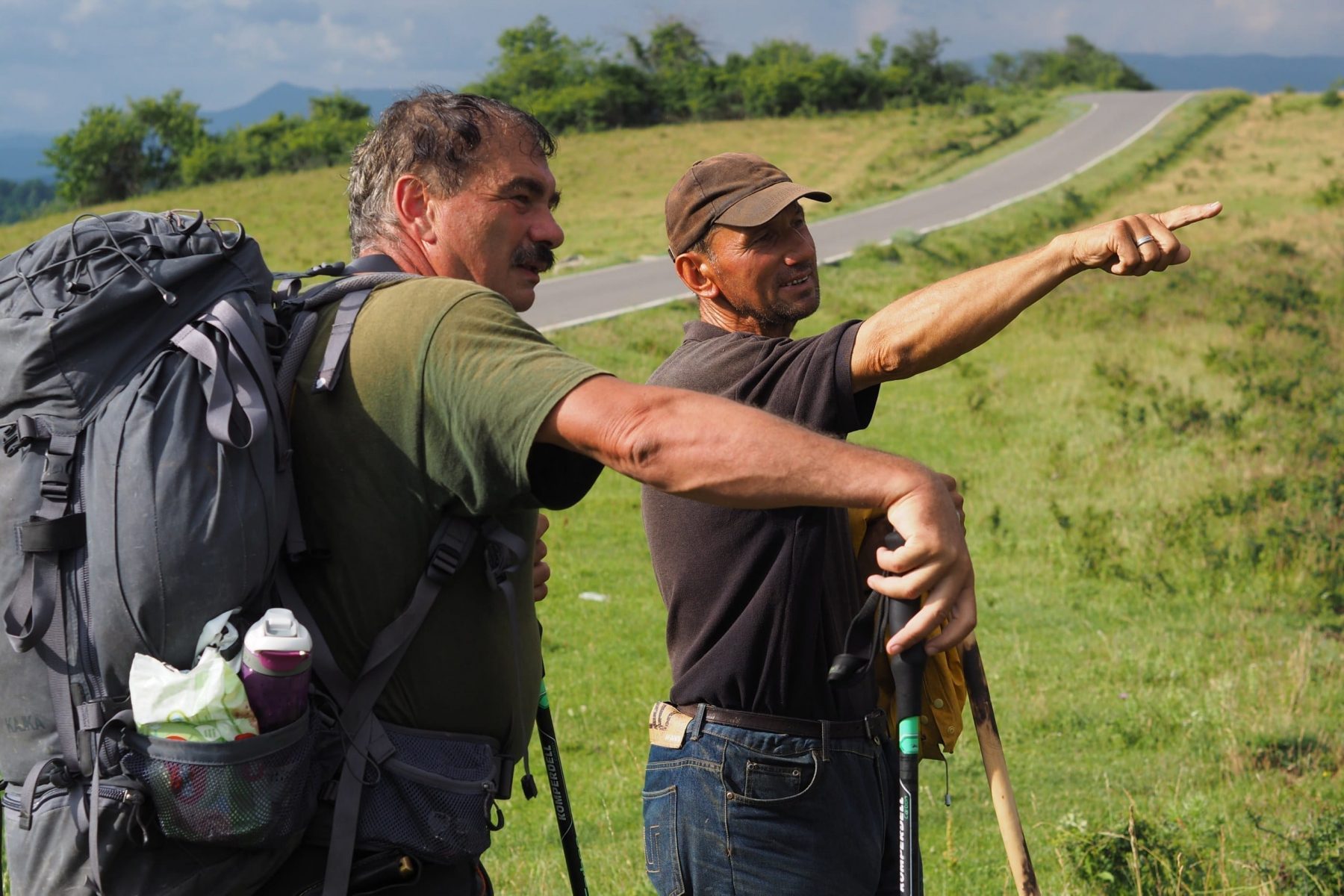
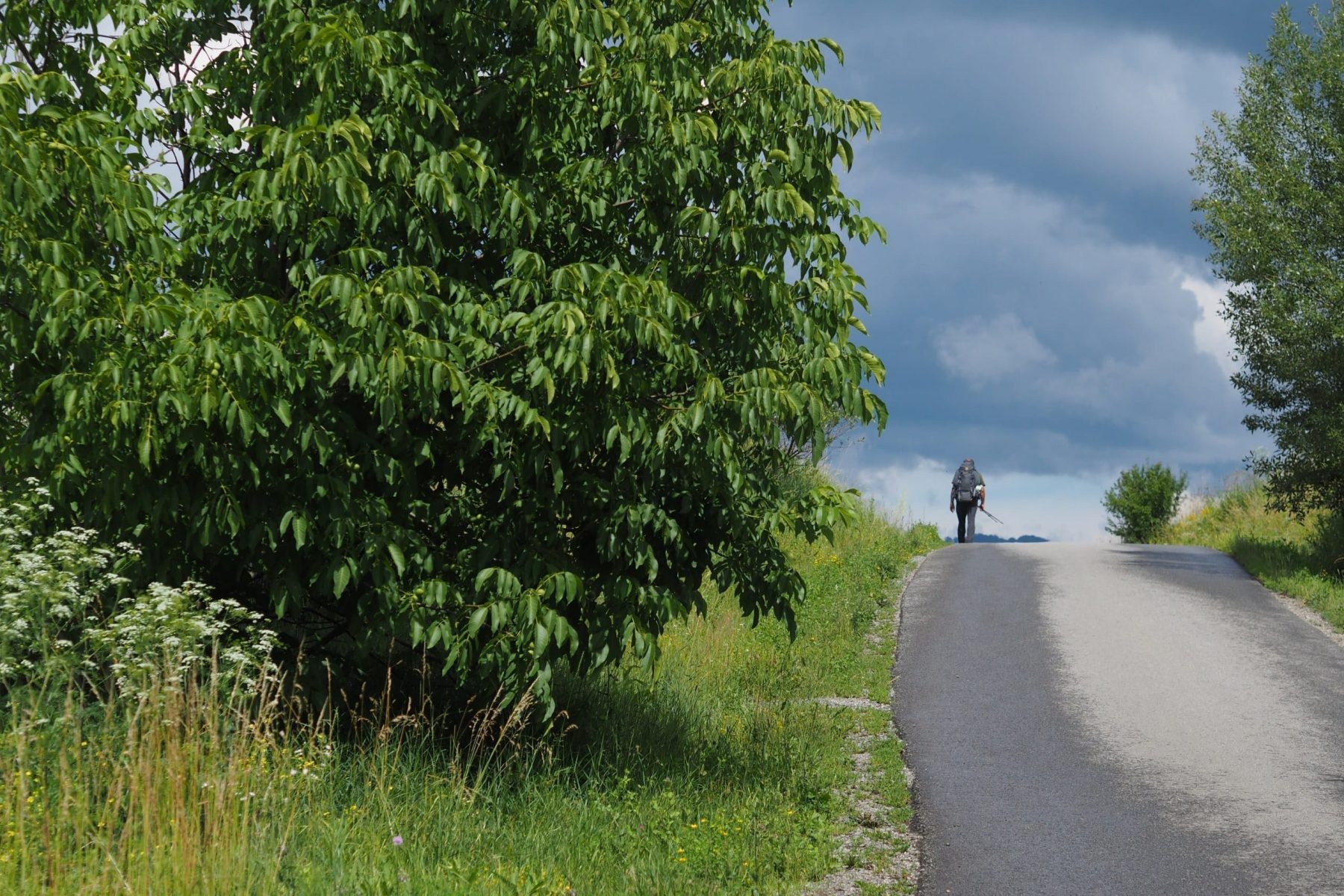
Day Nine
We enter in Odorhei descending on a hill, next to a farm. After so many landscapes and villages, we carefully step as on thorns, with the humility given by this fusion with the crowds where you become just another passer-by.
“You are sick of the city because nobody knows you there. You can die without anybody having any idea who you are”.
This is what my neighbor from the mountains pondered, expressing the peasants’ atavistic fright of any urban congestion in which you become the perfect stranger. Or, as they say in Transylvania, “nime-n drum (nobody on the road)”.
After you have spent many days scouring the world of the village, which has its own unwritten rules and a certain mental coherence, a city seems like a shrillness nightmare. Apart from freshly renovated historical buildings, you come across monstrosities such as the ANAF headquarters. A sort of green glass barn, with the claims of a failed skyscraper, from which people with files come and go like the bees at the bee entrance. I think that all the glass architecture in Romania should be immediately blown to pieces, by some decree.
The beer garden where we pull at has high standards. The waiters are groovy, gelled, they seem to move with style, but wear fake wristwatches. To loosen the haughty atmosphere, we discretely take our shoes of under the table, like gentlemen. Our naked soles are leeches sucking the coolness of the cold gritstone.
In the menu we find all sorts of fantasies, of which we amuse ourselves. My eyes fall on a meal with an irresistible title: “The King’s Preference.” It doesn’t matter that I don’t have a centimeter of clean fabric on me, I don’t care what it contains, how much it costs, I want it! I want to go all out, to spoil myself. This meal name, whatever it may be, reminds me of a Vegas restaurant ad: Eat like a king, drink like the village idiot!
While we eat, we vote: will we walk another 30 kilometers to the south, another day, or will we simply buzz off to home, with the first bus? With two abstentions and two votes “for,” we decide that, it’s over, the 200 kilometers are enough for us.

Day Ten – Conclusions
“To travel on a portion of Via Transilvanica is an impetus. Beyond crossing, seemingly for nothing, the same landscape, where the hills, fields and forests alternate, a state of grace emerges at some point. It is a state of grace of search and recovery.
For my part, I have found myself in the old households forgotten by the world that matters, the one in which the powerful people of today make the games. I have found myself in the scents and tastes that accompany those places. I have found myself because these things are actually me, the child who has left the primordial world, not knowing then what he was living: a magical world.
We walked 200 kilometers in 9 days, and we returned from where we left in just a few hours, changing two buses. In those hours, I have transcribed fresh thoughts and emotions experienced in those days.
Many times, I have travelled day after day by car. I have worked for weeks, months, years, but I haven’t written, ever, anything about all of these. A great amount of this time I have lived will not become a recollection burdened with feelings.
That is why I believe that any journey that guides you imperceptibly, through simple and obsolete tricks, toward yourself acquires the opportunities of an earned, recuperated and, finally, lived time”. (Toma Fărcane, aka don Tomasso)
“I have started this unknown path with worries, and I returned with certainty. I could feel the dampness of thoughts climbing the walls of my mind: Will we be able to carry out the project? Will we let people down, or will we let even ourselves down with so many problems we encounter until discovering the obvious direction?
And then we kept walking. Walking helps. It brings peace to human soul! Let all your questions, your quandaries and doubts come in bulk to your mind. Then, without doing anything special, but just walking down the road, they all melt gradually into a sea of sensations: scent of bedstraw flowers, bitter cherry taste, rain drops, people’s words, sweat flowing down your forehead into the eyes or just the long cattle lowing, when it gets dark.
And suddenly, the soul is lighter, and life becomes much simpler and clearer. I think we need this journey. It can give us peace and calm in troubled times”. (Mircea Miclea, aka Brother Kiril)
“In a country that looks like having lost its (political) minds and direction, in a country struck by the curse of eternal stiffness in the project, how would it be to imagine a genuine, impeccably marked road that would bear a story, from a point A to a point B? It’s like you suddenly find the terra ferma beneath your soles while sinking into a marsh. How would it be to rediscover, while marching, the inner fiber of your country? How exactly would it be to fall again in love with your country, forgetting a little bit about those who want to lead us on obscure ways, only known by them?
This is for me the dream called Via Transilvanica. It is a paradoxical dream of revelation and oblivion.
Concretely, beyond the unparalleled experience of friendship, I have understood three things from the 200 kilometers I walked:
A. That our historical delay and clinging to ancient customs can become real chances for an eco-ethnic type of tourism, charming and hard to find in other European countries. Rural Romania has a unique story and it had better take it seriously.
B. Walking a long way, you rediscover the forgotten art of looking at the reality, attentively, not cosmeticized, as it is delivered to you. It’s a child’s wonder when perceiving the world through people, insects and birds, through insignificant things and archetypal gestures.
C. That this country of ours is still generous with people. It gives you the feeling of safety and freedom to wander fearlessly around at your heart’s desire. And encountering the Other, either Romanian, Hungarian, Roma, Bulgarian or Saxon, is usually a good chance to celebrate alterity”. It is a sublime manner of valuing the differences that bring us together”. (Metodie Voicu Bojan, aka Brother Metodie)
“The Monor was spreading in front of us when I have nostalgically recalled that three years ago, I was on a similar hill, close to Santiago de Compostela. It was once said that, in that place, the man belonging to a group of pilgrims, who sees the first roof of the cathedral built on the very tomb of the Apostle Jacob, is entitled to be named Rey.
After walking over 1,000 kilometers from Bordeaux, I had confused thoughts at that time. One of them was very clear: My journey cannot possibly end here.
And then, even after having arrived at the cathedral, I left for Finisterre, returned to Santiago, went to Porto, and all my days of my journey were over, that thought was still haunting me.
I returned on the trail with my son Mattis. And we’ve covered other 100 kilometers together on the Camino Portugues, rather to convince myself whether the way still looks or not like the one I had once traveled by myself.
And, somehow, I wished to determine my lad to fall in love with walking alongside thousands and thousands of young people of his age, who were roaming on those paths. And again, the same thought visited me: that the way cannot stop abruptly, in that beautiful moment when we arrive and stand with our mouth open near the cathedral that represents the climax for the thousands of people who are entering Santiago every day.

Over time, I reached an answer on the hill near Monor: Via Transilvanica is a way that matters, it’s a worthwhile way. May be, long ago, an apostle has journeyed on this road, and he will give us from his absolute strength to go on to the end. I only know one thing: the excitement I have felt while walking this road of ours is nothing less than everything we experienced on El Camino. (Alin Uhlmann-Ușeriu, aka Mister Captain)
Voicu BOJAN
main photo: Mihai Țuțu
(From the special edition of TB 86 – „ENJOY TRANSYLVANIA!” – 14 May – 10 June 2019)

